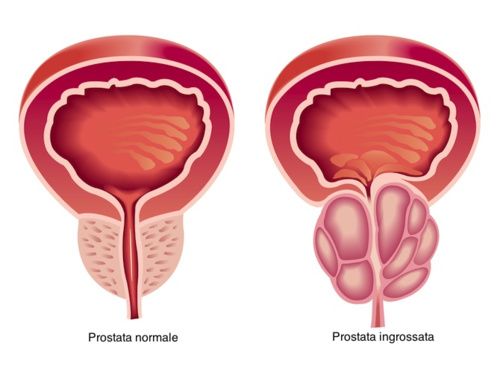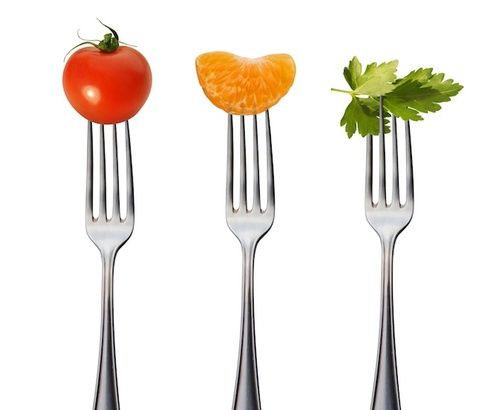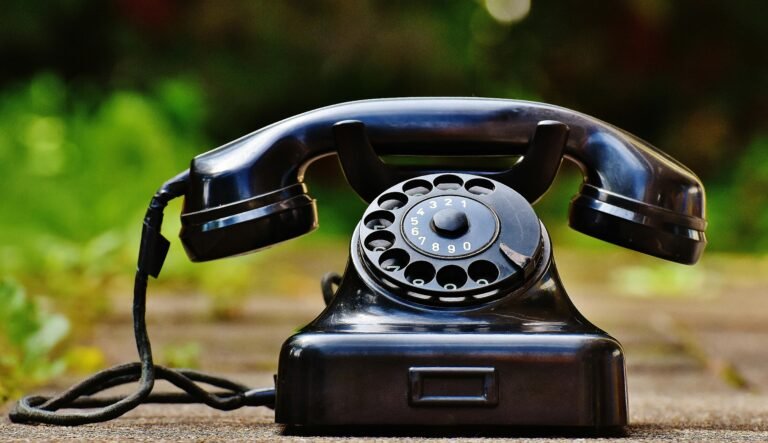Prostatitis: symptoms, causes, all remedies
Prostatitis affects men and is inflammation of the endocrine gland of the male urogenital system known as the prostate . It can occur in an acute or chronic form and depend on infections , but also smoking or a sedentary lifestyle. Let’s find out better.
> Symptoms of prostatitis
> Causes
> Diagnosis
> Treatments for prostatitis
Difference between normal prostate and enlarged prostate

Symptoms of prostatitis
First of all it must be specified that clinically the symptoms vary according to the nature of the pathology. In fact, there is an acute and a chronic prostatitis which present with different symptoms.
Acute prostatitis occurs frequently with difficulty in starting urination, burning (stranguria), increased frequency (pollakiuria), even nocturnal (nocturia), a sense of urgency and a non-empty bladder. In some cases there may be fever with shivering and blood in the semen or painful ejaculation.
When it is chronic it means that the symptoms persist for more than three months. There is usually no fever, but irritative symptoms (pollakiuria, nocturia, urgency, stranguria) and pelvic pain are present .
Causes
Among the causes of this pathology are factors of an infectious nature. The most common germs belong to strains of Escherichia coli and less frequently Proteus, Klebsiella, Enterobacteria, Pseudomonas, Serratia. If these germs enter during intercourse, it can create an ascending urethral infection that leads to bacterial prostatitis. Even unprotected anal intercourse can be a documented cause of urethritis, cystitis , acute epididymitis, bacterial prostatitis.
A further cause is also a reflux of infected urine into the prostatic ducts which flow into the posterior urethra.
Other triggers of inflammation are: intestinal dysfunction, irregular diet , smoking, sedentary lifestyle and hemorrhoids. Sexual abstinence and the reduction of ejaculations for medium to long periods . Interrupted coitus could induce forcing with micro-lesions of the prostatic structures which in the long run activate inflammatory reactions.
Concauses are certainly stress and various delicate emotional situations. Dysfunction and narrowing of the prostatic urethra with intraprostatic back diffusion of urine, phimosis and paraphimosis can be other triggers.
Immune dysfunctions and disc pathologies (L1-S1) are being investigated as an additional possible cause.
Diagnosis
The diagnosis of prostatitis occurs by:
- Digital rectal examination : the doctor puts on a glove and introduces the index finger inside the rectum, previously rubrified.
- Prostate secretion culture : with prostate massage, the secretion is obtained which is then collected and examined.
- Spermiogram : the leukocyte concentration and the possible presence of bacterial colonizations in the spermatozoa are analyzed.
- Trans-rectal ultrasound (TRUS) ;
- Prostatic acid phosphatase assay;
- Biochemical analysis of the sperm;
- Scrotum-testicular ultrasound with doppler phase.
TREATMENT FOR PROSTATITIS
Diet
It is good to consume foods rich in vitamins and other nutrients useful for strengthening the immune system . Excellent foods rich in lycopene , found for example in tomatoes, polyphenols (in green tea), resveratrol (in grapes) and isoflavones (one of the highest concentrations is found in soy, look for it non-GMO).
Excellent foods rich in micronutrients such as selenium, zinc, vitamin E and D3, which have an antioxidant effect and protect the prostate cells from dangerous free radicals , produced during normal metabolic processes and responsible for tissue aging.
Remember that caffeinated drinks irritate the prostate, as do poor hydration, tobacco, and alcohol.
You can learn more about the properties of the vitamin and the foods that contain them

Herbal remedies for prostatitis
Nature offers a wide range of remedies to treat prostatitis ranging from medicinal plants ( serenoa , bearberry ), bud extractives (Sequoia gigantea), natural substances ( pollen , pumpkin seeds ) which perform an anti-inflammatory and antibacterial and rebalancing action. male hormone system, to treat prostate disorders.
Traditional Chinese Medicine
Chinese medicine treats inflammation both with acupuncture and with herbal preparations to “calm the fire” that generates it. In other words, the Chinese perspective identifies as the cause of prostatitis an accumulation of Heat with the development of toxic Fire accompanied by blood stasis.
The remedies and treatments therefore aim to purify the heat, promote blood circulation.
The so-called ” Diuretic and Anti-inflammatory Pill” comes from China , conceived by the Chinese expert Dr. Li Xiaoping, specialized in pathologies of the urinary and reproductive system, who has been involved in the study of the remedy for about 30 years.
After careful observation of the manifestations that accompany the disorder, such as red tongue without patina or with sticky yellow patina at the base of the tongue ( kidney area ), and after reading the pulse and analyzing the pathological precursors, a treatment is started that together taking the pill provides other works aimed at toning the Qi , nourishing the Kidney- Yin , draining the Moisture / Heat, moving the Blood.
Homeopathy in case of prostatitis
Each homeopathic remedy recommended by the expert in case of prostatitis has a different value. The nature of the disorder and the difference in manifestation of symptoms enable the homeopath to conduct a comprehensive analysis.
Sabal serrulata is indicated when there are frequent nocturnal urinations, decrease and delay in the force of the jet, discomfort and perineal heaviness. This last discomfort, if accompanied by an intermittent jet and pain in urination, can lead the homeopath to report Conium Maculatum , which is also administered when the patient reports incomplete or labile erections, involuntary sperm emission due to sexual arousal on a psychic level. Chimaphila Umbellata is used instead if the patient feels a burning pain and the urine is scarce and nauseating, with thick mucus and sometimes blood.
Pareira Brava is used in chronic forms, when there are repeated urinary blocks with kidney stones. Sulfur is useful in prostatic hypertrophy. The prostatitis that causes burning pains, to pangs that improve with cold applications is typical of Argentum Nitricum . Almost all the remedies listed are used more frequently in the acute phase and the indications on dilutions range from 5 CH to 30 CH. These are general indications on the most common remedies; the last word – we remember – always remains with the trusted homeopath.
Exercises and movement in case of prostatitis
It is useful to follow an exercise program for the muscles of the pelvis . An example? From standing, as you inhale, rotate your pelvis forward creating tension in the anus. As you exhale, release the tension by rolling your pelvis backwards. From lying on your stomach, legs bent, on exhalation squeeze your knees and rise with the pelvis and then descend. The exercises that you can perform lying on your side are also good, trying to lead the breath so that it works in enlarging the intercostal volume.
Yoga’s “Cat-cow” is very good , performed on the four points of support, palms, knees, back of the foot. Work your abdominal muscles and connect your breathing. Let go of the cervical when arching upward.
In the universe of yoga, an asana works very well which in Sanskrit (the ancient Indian language) takes the name of Paschimottanasana or “the posture of the back stretch”.
Recent studies conducted by Stanford University have re-launched the hypothesis of a neuromuscular origin of the disease and have reduced the bacterial one (about 5% of the total). It seems that the work on the pelvic muscles that is done with yoga helps a lot in preventing prostatitis .
Not only; Aispep is promoting a protocol to monitor improvements through relaxation and stretching practices . Breathing also matters a lot .
In general, avoid conditions where stress becomes difficult to manage. Situations to which it is not known how to respond adequately and effectively can lead to the generation of uric acids due to the metabolization of the eliminated cells.
“Eliminate” all sedentary habits: in the area that goes from the genitals to the anus ( perineum ), a good circulation of blood and lymph must always be maintained.
If we are faced with bacterial prostatitis, it may be useful to resort to a radical colon cleansing ; if its walls are inflamed, in fact, toxic substances can come out which, over time, poison the environment surrounding the prostate. Hygiene is achieved with 4-5 sessions of colon hydrotherapy performed with experts and distributed over time.
























+ There are no comments
Add yours